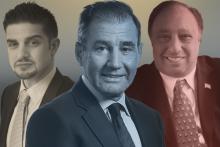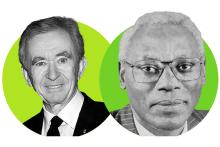Buffett: 'I love buying businesses

When Warren Buffett's European tour took him to Switzerland, Marc Smith was there to find out if the legendary investor was planning a family business acquisition
After several weeks of speculation, Warren Buffett has come face to face with Europe's family business owners to explain why he is so interested in acquiring one of their
companies.
"Family-owned businesses share our long-term orientation, belief in hard work and a no-nonsense approach and respect for a strong corporate culture," said Buffett, speaking last month in Lausanne at Swiss business school IMD. "Family businesses and [his investment house] Berkshire Hathaway have a common philosophy and make a good team."
The American investor and philanthropist's visit to IMD was part of a four-day whistle-stop tour of Europe, where he held a closed session with European family business leaders and spoke to an MBA class.
"I will buy any business in any country in the world as long as it generates $75 million pre tax," said Buffett, "but I meet two companies per year [in which I want to invest] if I'm lucky." Nevertheless, he revealed he is hoping that the phone rings or that a fax comes through with a deal that he would be interested in.
He was also keen to assure his audience that he was not in Europe to aggressively search out takeover targets. "We don't buy when we are ready to buy, we buy when others are ready to sell," said Buffett. "And when we buy a business, we buy that
business to keep."
He cited the example of Iscar, the Israeli cutting-tools company in which he purchased an 80% stake from the owning Wertheimer family. This deal, which dates back to 2006, was Berkshire Hathaway's first major foreign investment and the third largest in its history.
Eitan Wertheimer, Iscar's president, was also present at IMD and stated how pleased he had been with Buffett's input since the deal. "We are surprised how much better than expected the company is doing [with Warren Buffett on board]," revealed Wertheimer.
Buffett said he believes that any family business that is looking to sell and get the best possible price should auction itself off to the highest bidder. However, he said that any family that "has been building up their business for decades, that cares and that wants to make sure it doesn't get sold a few years later based on the fashions of Wall Street" only has one choice. "They should invest with us," he said categorically.
Buffett owns about a third of Berkshire Hathaway, the investment house he built over four decades from a failing clothing manufacturer into a company with businesses that range from candy-making to insurance and a $75 billion stock portfolio.
The 77-year-old has focused heavily on deals in the US in the past, but has indicated that a dearth of deals in his homeland has brought him to Europe. In addition, the current state of the weak US currency market is further tempting Buffett to invest outside of North America, where he has made a lot of money betting against the dollar.
However, he insisted that he was not disappointed with US businesses. Nor was he strategically diversifying away from the US dollar. "It's not something I'm doing deliberately," he said, although he admitted it had clearly helped him to look more closely at companies in Europe and the rest of the world.
Affectionately known as the "sage of Omaha", Buffett typically invests in well-run, privately held companies with high barriers to entry, which makes family businesses particularly appealing. Crucially, he is not renowned for involving himself in the operational side of businesses he invests in, preferring to let the management do their job.
As well as the Iscar deal, he has recently courted other family businesses. In January this year he bought a majority stake in Marmon Holdings, an international association owned by the US-based Pritzker family. He is also a director of The Washington Post Company, owned by the Graham family.
"I love buying businesses!" he said, although he admitted he had "not taken a sample" of European family businesses, which tend to be much more closely tied to the family, compared to their US counterparts. Not that he sees this as a problem to any future deals.
"About half the businesses I have bought are family businesses and there are different families in every case," he said. "I don't know enough about [family businesses in Europe], but I would guess that they are as diverse in Europe, and for that matter in Asia, as they are in the US."
Buffett said that by acquiring the business he is usually able to solve specific problems it may have, such as succession issues, that the families themselves cannot. "Their solution is going to tear up a family one way or another, whereas with my solution someone might be mad at me but it won't destroy a family."
He said he has twice encountered a situation where the mother and father differed about which one of the children or in-laws should take over. "Rather than have some terrible fight they just handed the problem on to me," he said.
Speaking to Families in Business about Buffett's visit, Erick Markman, an IMD MBA student and the grandson of the founder of Stockholm-based Camfil Farr, an air filtration business, said: "I was surprised how similar he is in real life to how he comes across on the TV."
During his visit to the school, Buffett spent an hour with the MBA class discussing a range of topics including his views on family businesses and his personal investment strategies.
"He seems a genuine guy and very down to earth," said Markman, who is still making up his mind about whether to join the family business.
Nevertheless, Markman perhaps spoke for many when he wondered about the strategy behind the trip. "How much of this is about Warren Buffett and how much of it is about Berkshire Hathaway?" he said.
As Europe's families ponder picking up the phone to the richest man in the world, this question could be answered in the coming weeks and months.






